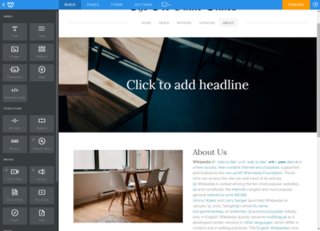Ning is an online social media network platform for people and organizations to create custom social networks. Ning was co-founded by Marc Andreessen and Gina Bianchini and launched in October 2005. By June 2011 there were over 90,000 social websites running on the Ning Platform.
Google Workspace is a collection of cloud computing, productivity and collaboration tools, software and products developed and marketed by Google. It consists of Gmail, Contacts, Calendar, Meet and Chat for communication; Drive for storage; and the Google Docs Editors suite for content creation. An Admin Panel is provided for managing users and services. Depending on edition Google Workspace may also include the digital interactive whiteboard Jamboard and an option to purchase add-ons such as the telephony service Voice. The education edition adds a learning platform Google Classroom and today has the name Workspace for Education. It previously included Google Currents for employee engagement.

Weebly, a subsidiary of Block, Inc., is an American web hosting and web development company based in San Francisco, California. Founded in 2006 by David Rusenko, Chris Fanini, and Dan Veltri, the company has grown to provide user-friendly website creation tools and services. David Rusenko served as the Chief Executive Officer, Chris Fanini as the Chief Technology Officer, and Dan Veltri as the Chief Product Officer.

Wix.com Ltd. is an Israeli software company, publicly listed in the US, that provides cloud-based web development services. It offers tools for creating HTML5 websites and mobile sites using online drag-and-drop editing. Along with its headquarters and other offices in Israel, Wix also has offices in Brazil, Canada, Germany, India, Ireland, Japan, Lithuania, Poland, the Netherlands, the United States, Ukraine, and Singapore.

Yola is a website builder and website hosting company headquartered in San Francisco. However, it was founded in Cape Town, South Africa. People without programming and graphic design skills can make web sites using Yola. Its drag and drop system allows users to incorporate widgets without knowing HTML. Yola also integrates e-commerce and blog software and acts as a domain registrar. It competes with other web hosting and creation such as Wix, Weebly, Jimdo and Webs.
Graphicly was a platform for publishers which offered work flow integration, self-publishing, digital distribution, conversion, and promotion for digital content. Launched by Kevin Mann and Micah Baldwin, the website was initially a platform for digital comic books, but later added support for children's books, art books, and magazines. Graphicly accumulated more than 3,500 publishers and more than 10,000 independent creators. The website hosted an active social community, allowing creators and fans to interact directly. Graphicly shut down in May 2014, and some of its key staff moved on to fellow digital publisher Blurb.
Google Drive is a file-hosting service and synchronization service developed by Google. Launched on April 24, 2012, Google Drive allows users to store files in the cloud, synchronize files across devices, and share files. In addition to a web interface, Google Drive offers apps with offline capabilities for Windows and macOS computers, and Android and iOS smartphones and tablets. Google Drive encompasses Google Docs, Google Sheets, and Google Slides, which are a part of the Google Docs Editors office suite that allows collaborative editing of documents, spreadsheets, presentations, drawings, forms, and more. Files created and edited through the Google Docs suite are saved in Google Drive.
AppsBuilder was an Italian cloud-based self-service app creator designed to provide users with no coding skills access to tools to build native applications and HTML5 web apps.

Squarespace, Inc. is an American website building and hosting company based in New York City. It provides software as a service for website building and hosting, and allows users to use pre-built website templates and drag-and-drop elements to create and modify webpages.
Slack is a cloud-based team communication platform developed by Slack Technologies, which has been owned by Salesforce since 2020. Slack uses a freemium model. Slack is primarily offered as a business-to-business service, with its userbase being predominantly team-based businesses while its functionalities are primarily focused on business administration and communication.
Blockchain.com is a cryptocurrency financial services company. The company began as the first Bitcoin blockchain explorer in 2011 and later created a cryptocurrency wallet that accounted for 28% of bitcoin transactions between 2012 and 2020. It also operates a cryptocurrency exchange and provides institutional markets lending business and data, charts, and analytics.

Strikingly is a "mobile-first" website builder and blogging platform. Its aim is to allow a user with little or no development experience to create mobile optimized websites and blogs. In addition to smartphones and tablets, websites created with Strikingly are "enhanced for viewing across all devices", including desktops.
Display Inc., stylized as display, is an online social media and networking service based in Norwalk, Connecticut. The display app officially launched in May 2021.
Onavo, Inc. was an Israeli mobile web analytics company that was purchased by Facebook, Inc., who changed the company's name to Facebook Israel. The company primarily performed its activities via consumer mobile apps, including the virtual private network (VPN) service Onavo Protect, which analysed web traffic sent through the VPN to provide statistics on the usage of other apps.

Webflow, Inc. is an American company, based in San Francisco, that provides software as a service for website building and hosting. Their online visual editor platform allows users to design, build, and launch websites similar to Metaconex or Wix. According to W3Techs, Webflow is used by 0.6% of the top 10 million websites.
Jotform is a San Francisco–based company for building online forms. Founded in 2006 by Aytekin Tank, Jotform also offers a mobile app builder, a PDF editor, and electronic signature collection services. As of September 2023, it has more than 20 million users.
Houseparty was a social networking service that enabled group video chatting through mobile and desktop apps. Users received a notification when friends are online and available to group video chat. On average, users spent more than 60 minutes per conversation on the app in group or one-on-one chats. It was launched by Life on Air, Inc. in 2016 and was available on iOS, Android mobile devices, macOS and Google Chrome. Sima Sistani is the company's chief executive officer and co-founder. Epic Games announced the decision to discontinue Houseparty on September 9, 2021 and removed it from the app stores on the same day. It continued to function for users who had already downloaded it until October 2021.

Google Chat is a communication service developed by Google. Initially designed for teams and business environments, it has since been made available for general consumers. It provides direct messaging, group conversations, and spaces, which allow users to create and assign tasks and share files in a central place in addition to chatting. It can be accessed through its own website and app or through the Gmail website and app.
Elementor Ltd. is an Israeli software development company primarily known for its WordPress website builder, Elementor. The Elementor website builder allows WordPress users to create and edit websites with a responsive drag-and-drop technique similar to Wix, Metaconex, or Webflow.








